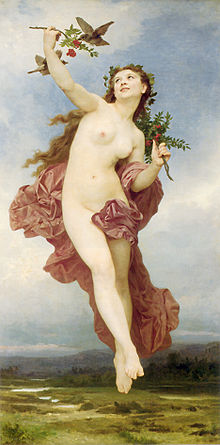Dies (mythology)
| Dies | |
|---|---|
Personification of day | |
 Hemera/Dies (1881) by William-Adolphe Bouguereau | |
| Personal information | |
| Parents | Chaos and Caligo |
| Siblings | Nox, Erebus, and Aether |
| Consort | Aether, Caelus |
| Children | Terra, Caelus, Mare |
| Equivalents | |
| Greek equivalent | Hemera |
In Roman mythology, Dies /ˈdaɪ.iːz/[1] (Latin diēs "day") was the personification of day. She was the daughter of Chaos and Caligo (Mist), and the counterpart of the Greek goddess Hemera.
Family[edit]
According to the Roman mythographer Hyginus, Chaos and Caligo were the parents of Nox (Night), Dies, Erebus (Darkness), and Aether.[2] Cicero says that Aether and Dies were the parents of Caelus (Sky).[3] While, Hyginus says that, in addition to Caelus, Aether and Dies were also the parents of Terra (Earth), and Mare (Sea).[4] Cicero also says that Dies and Caelus were the parents of Mercury, the Roman counterpart of Hermes.[5]
Name[edit]
The Latin noun diēs is based on the Proto-Italic accusative singular *dijēm, itself stemming from the Proto-Indo-European root *dyeu-, denoting the "diurnal sky" or the "brightness of the day" (in contrast to the darkness of the night).[6][7] The corresponding Proto-Indo-European day god is *Dyeus.
See also[edit]
Notes[edit]
- ^ "dies". Oxford English Dictionary (Online ed.). Oxford University Press. (Subscription or participating institution membership required.)
- ^ Hyginus, Fabulae Theogony 1 (Smith and Trzaskoma, p. 95).
- ^ Cicero, De Natura Deorum 3.44.
- ^ Hyginus, Fabulae Theogony 1–2 (Smith and Trzaskoma, p. 95).
- ^ Cicero, De Natura Deorum 3.56.
- ^ de Vaan 2008, p. 170.
- ^ West 2007, p. 167.
References[edit]
- Cicero, Marcus Tullius, De Natura Deorum in Cicero: On the Nature of the Gods. Academics, translated by H. Rackham, Loeb Classical Library No. 268, Cambridge, Massachusetts, Harvard University Press, first published 1933, revised 1951. ISBN 978-0-674-99296-2. Online version at Harvard University Press. Internet Archive.
- Hyginus, Gaius Julius, Fabulae in Apollodorus' Library and Hyginus' Fabulae: Two Handbooks of Greek Mythology, Translated, with Introductions by R. Scott Smith and Stephen M. Trzaskoma, Hackett Publishing Company, 2007. ISBN 978-0-87220-821-6.
- de Vaan, Michiel (2008). Etymological Dictionary of Latin and the other Italic Languages. Brill. ISBN 9789004167971.
- West, Martin L. (2007). Indo-European Poetry and Myth. Oxford University Press. ISBN 978-0-19-928075-9.
External links[edit]
 The dictionary definition of Dies at Wiktionary
The dictionary definition of Dies at Wiktionary


 French
French Deutsch
Deutsch